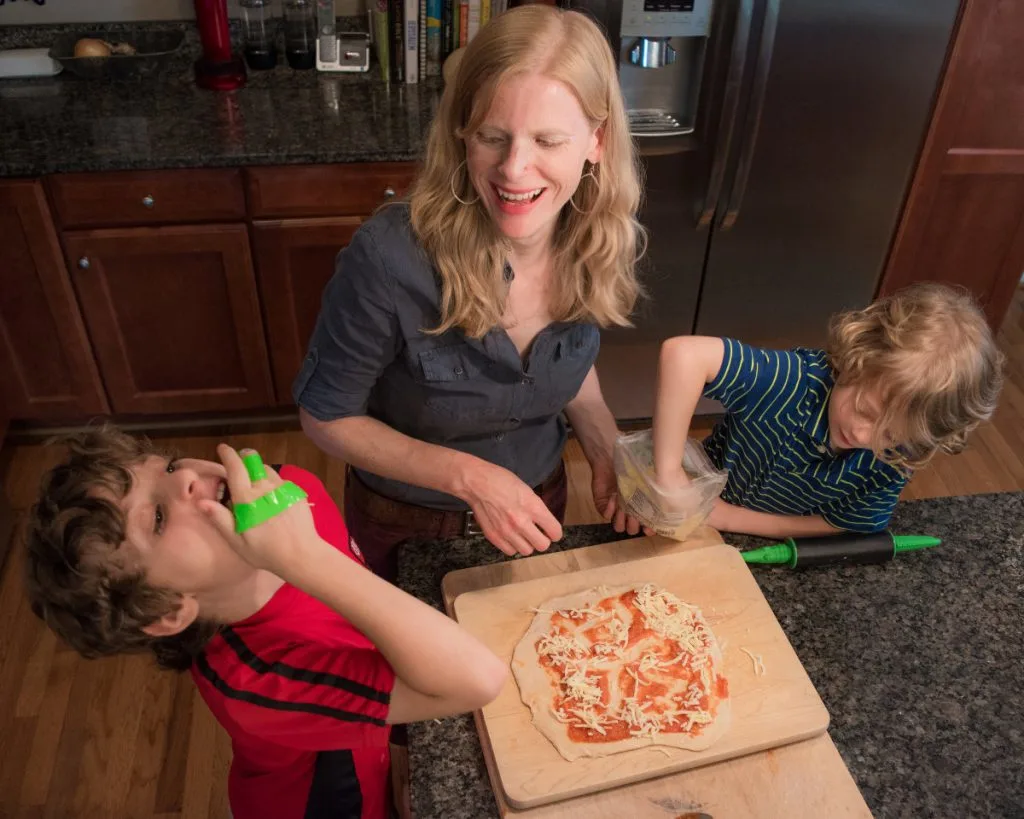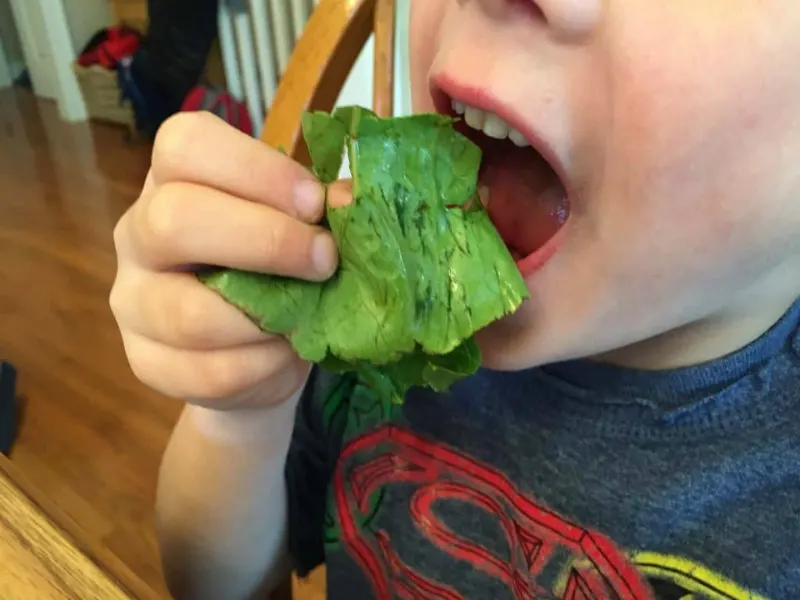Parenting can be a lot of hard work. One area that many parents find more challenging than others is feeding their kids. To my mind, there are two important aspects to feeding our children: actually getting food into them and helping them to develop a happy and healthy relationship with food. Here at The Scramble we have lots of resources specifically designed to help with the first challenge (check out our family-friendly meal planning service, recipe search, and content on easy cooking), but in this post I wanted to address the other piece: how to raise healthy eaters.

As someone who grew up with a very unhappy relationship with food and my body, one of my top priorities when I became a mom was to do my best to raise my kids to both enjoy food and have a peaceful relationship with it. I wanted to raise healthy eaters who would enjoy a relatively balanced diet while also being able to savor sweets and snacks without guilt. I will be the first to tell you that this road has not be as smooth as I might have liked, but in overcoming some of the challenges we have faced, I have learned a great deal about how to raise healthy eaters. So, I wanted to share some of my favorite easy ways to change the food dynamics in your household that will both encourage healthy eating and the enjoyment of treats.

The Real Deal: Stories of Wins and Losses in My Attempt to Raise Healthy Eaters
If you have experienced any challenges with feeding your kids, from picky eating to allergies to eating disorders, then I can almost guarantee that you have also at some point experienced either judgement from others or the gift of unsolicited (self-righteous) advice, or both. So, both to help you feel a bit less alone and to show that I am not at all perfect, I wanted to share a couple of quick vignettes from my own adventures in feeding my kids and a little bit about what these experiences taught me about how to raise healthy eaters.
My kid refused birthday cake
One Sunday afternoon, my then 9-year-old went to a birthday party. He had an amazing time and came back glowing from all the fun he had. Then, at dinner, as he was telling us about the party he mentioned that he hadn’t eaten the birthday cake. I looked to my husband, who had picked him up from the party, and he confirmed that it was true. I was stunned. I mean, a kid saying no to birthday cake?! I asked him why he hadn’t had cake and he said, “I wanted to save my treat for something I really wanted.” At first, I thought of this as a win – my kid was making “healthy” choices – but then I realized that it was actually a loss because instead of just relaxing and having fun in the moment, he was restricting himself and make deals with himself in his head – a behavior I knew all too well from my years of disordered eating. At that moment I realized that I needed to do a better job of helping my kids to relax around food.
My Kid Only Ate French or Crusty White Bread for 3 Years
When one of my sons was about 6, he decided that the sliced whole wheat bread that he had been enjoying his whole life was suddenly disgusting and that the only breads that he was willing to eat were French bread or a crusty white loaf from the bakery section of the grocery store. As a health coach and healthy food blogger, I was mortified. I felt like I had to explain this phase to everyone who saw his lunches. Finally, after a few months of trying to convince him to change his mind, I realized that in fighting him on his preference I was creating tension rather than trust when it came to food. So, I decided to let it go and trust that another shift would eventually come.
The breakthrough came when I discovered a crusty whole wheat loaf that he enjoyed. Once he realized he enjoyed whole wheat bread in one form, he became much more open to it in other forms. In all, the stage lasted for about 2 years, but I’m happy to say that now he will eat pretty much any bread options we have in the house (although he still much prefers crusty loaves to sliced bread, but I do too, so I can’t hold that against him!).

My Vegetable-Resistant Kid Ate 3 Servings of Salad
Because I am a believer in the Division of Responsibility approach to feeding my kids, one thing that I try to do each night is to make sure that there is at least one dish on the table that each person feels pretty good about eating. This is so that if one of my kids doesn’t like most of the food on the table, they can fall back on the thing they do enjoy (note: this doesn’t mean that I make multiple dishes – sometimes that fall back food is just plain rice or slices of bread).
One night, when my son (who was a picky eater for many years) was around 5, I made a new pasta dish for dinner. I had chosen the recipe with him in mind because it included two ingredients he really loved: asparagus and goat cheese. Unfortunately, he wasn’t a big fan. He took a couple of bites and then quietly turned to me and said that it wasn’t his favorite. I replied, “Thank you for trying. That’s fine. You can have salad.” Then I held my breath expecting a meltdown because this kid had refused to eat salad for years. The pasta dish was supposed to be his safe option that night. But I was floored when the meltdown never came! Instead, he served himself some salad, asked for some dressing, and went to town. He ate three servings of salad and then asked if he could have a slice of bread with butter, which I, of course, said yes to.
From this experience I learned two things: (1) over time kids will change their minds and (2) that allowing space for them to express their taste preferences (without being rude) is essential to having a calm and productive dynamic at the table.
My Teen Started Restricting His Food
After surviving and then coming out the other side of having a picky eater, I thought that our stressful eating phases were behind us. I thought I has mastered raising healthy eaters. But then, during a very stressful time in his life, one of my kids started to become incredibly restrictive about what he would and wouldn’t eat. At the time, he was very focused on his physique and became convinced that the only way that he could achieve the body he wanted was by working out intensely and cutting all foods he deemed unhealthy out of his diet. He refused desserts, snack foods, most dairy, and any refined grains. As someone who had struggled with orthorexia and bulimia myself, these patterns were all too familiar and I was devastated. It felt like I had failed as a parent.
It was one of the hardest things I have ever had to navigate as a mom, but both by tackling the real issues that were causing him stress and gently offering a differing perspective, without focusing on the food too much, he was able to come out the other side. He still cares deeply about his health and tries to avoid unnecessary sugar and “junk” foods, but he will now eat desserts and snacks from time to time and has even acknowledged (unsolicited) that restricting his eating actually made him really miserable and likely slowed the muscle growth he so desired.
This experience taught me that the development of a healthy relationship with food is a long and winding process, but that the trust I had built over time was key because we could have open and gentle conversations about what was happening without him feeling judged or defensive. To this day, I believe that if the dinner table had been a battle ground before this, the outcome could have been very different.

What I’ve Learned About How to Raise Healthy Eaters
Looking back on all of these experiences, there common threads that point to what I see as the four essential pieces to raising healthy eaters who have a happy relationship with food.
1) Consistency
Over the years, I have tried to be very consistent with my messaging around food. I talk all the time about how food serves three important roles in our lives: it nourishes us, it gives us pleasure, and it connects us with other people. I have been clear about the fact that I believe that healthy eating is about balance – when they were younger I used to say that we wanted to make sure most of our meals consisted of “growing foods,” but that “treat” foods also have value. I believe that by being consistent in how I talk about food and my philosophy on what healthy eating looks like, I have given them a sort of home base that they can return to, even when it’s hard.
2) Flexibility
While the messaging about healthy eating has been consistent, I have always made sure to allow for exceptions and to communicate about them clearly when they occur. So, for example, when they were little we had a one-treat-a-day guideline. They were allowed to have one treat a day, but they also got to choose what that treat was (from what was available in the house) and when they ate it. But, if we had special occasions such as birthday parties or Halloween, for example, that one-treat-a-day guideline was put aside so that they could enjoy the experience without stressing about what they ate.
3) No deprivation
Because I wanted my kids to learn moderation and also because I never wanted them to feel like they needed to sneak, hoard, or binge on foods, I made it known that no foods were 100% off limits. That meant that I never hid or locked away food and remained open to them trying new things they were curious about (even if I thought they were gross). This both helped to demystify foods and build trust in our relationship.
4) Sharing the Control
In the Division of Responsibility approach to feeding kids, there is this concept that parents and kids should share the control. So, for instance, you get to choose what time a meal is served and what is offered, but the child gets to decide how much they will eat and also which of the foods offered they will have. This means that, when possible, I serve everything family style so that they can make their own choices, ask them for input on meals for the week, and invite them to cook with me. Doing this has both given them confidence to express their preferences and also built a sense of mutual respect and trust when it comes to food.
In the end, my goal is to both teach and show my kids that healthy eating isn’t about the percentage of your diet that is one food or another; it is about having a relationship with food where you can enjoy whatever you are eating without guilt, preoccupation, or fear. It is balance.
Have you had recent successes discovering how to raise healthy eaters? Or is there an area in which you are struggling? I’d love to hear about it in the comments!
Want more tips and tricks for feeding your kids? We have a whole section of our site dedicated to the topic of raising healthy eaters and picky eater solutions!

Crispy Honey Peanut-Oat Bites: An Easy Weeknight Dessert
Friday 10th of February 2023
[…] When they were little, I taught them about moderation by suggesting that we limit ourselves to one treat per day (with exceptions made for special events and holidays). As they have gotten older, though, I no […]